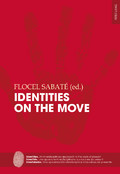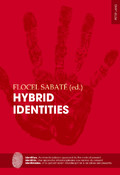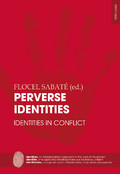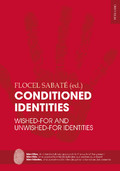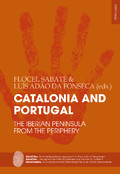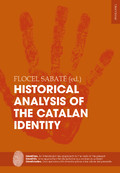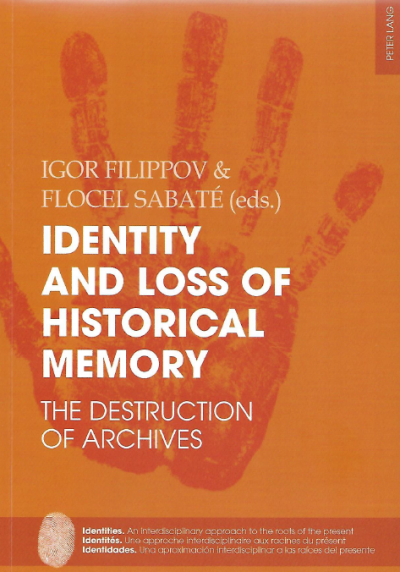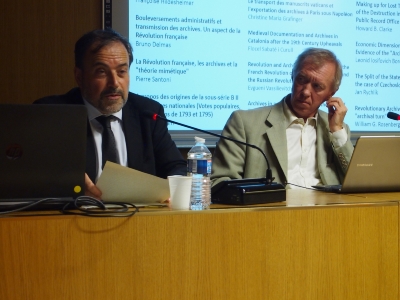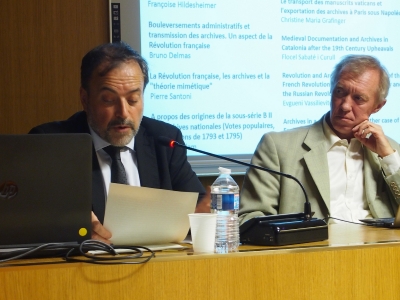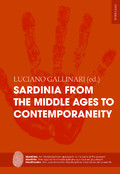Identities
Download PdfIdentities on the move
Flocel Sabaté (ed.)
Bern, 2014
9783035199352
"This book contains selected papers from the meetings «To think the Identity» and «Identities on the move» held in the Institute for Research into Identities and Society (University of Lleida) during 2010. The aim is to understand the reasons that allow social cohesion throughout the creation of identities and its adaptation. Identity is individual and collective, momentary and secular, apparently contradictory terms that can only coexist and fructify if they entail a constant adaptation. Thus, in a changing world, the identities are always on the move and the continuity of society requires a permanent move. Values, Culture, Language and History show the societies in permanent evolution, and demand an interdisciplinary perspective for studying. Attending this scope, outstanding historians, sociologists, linguistics and scientists offer here a diachronic and interdisciplinary approach to this phenomenon: how men and women have been combining the identity and the move in order to feel save into a social life from Middle Ages to current days, and how different items, in our present society, built the framework of identities". Source: www.peterlang.com
Hybrid identities
Flocel Sabaté (ed.)
Bern, 2014
9783035197556
"This book dissiminates a selected collection of research texts from the Congress Hybrid Identities, held in 2011 in the Institute for Research into Identities and Society (University of Lleida, Catalonia, Spain). Outstanding researchers from Social and Humanities fields adapted the hybridization of society such as a new perspective in order to study and understand the evolution of conviviality from the Middle Ages to current days throughout a comparative space and time. Taking the concept from the anthropology, the hybridization became a new approach for social studies and Humanities. Hybridization offers a historical perspective in order to renew perspectives for study different societies during all historical periods since Middle Ages to current days. At the same time, hybridization appears as a tool for analysing social realities in the different continents of the word. In any case, it is a new way in order to understand how the societies reaches its respective cohesions throughout mixted identities". Source: www.peterlang.com
Perverse identities. Identities in conflict
Flocel Sabaté (ed.)
Bern, 2015
9783035195279
"The urgent need for the study of exclusive identities in conflict is ever more apparent in a globalizing world in which societies are becoming multicultural and complex and in which inter-cultural contact and the co-existence of languages and cultures comes increasingly to bear on the construction of plural identities. The present book considers perversion in the construction of identity and the perverse usage of identity in areas such as social cohesion – xenophobia, racism, ostracism, rejection, ageism, marginalisation – and the mismanagement of linguistic identity, language groups and associated discriminatory practise arising out of historical and culturally based discrimination. The texts were submitted in an international meeting held in the Institute for Identities and Societies of the University on Lleida (Catalonia, Spain) in November 2012". Source: www.peterlang.com
Conditioned identities. Wished-for and unwished-for identities
Flocel Sabaté (ed.)
Bern, 2015
9783035194241
"This book contains selected papers from the meeting «Conditioned Identities. Wished-for and Unwished-for Identities», held in the Institute of Research in Identities and Society (University of Lleida) in 2013 and attended by participants representing different disciplines, discussing the imposition and acceptance of identities. The different chapters of the book, written by scholars and researchers from all over the world, analyse the conflict between attributed and chosen identities in History, Language, Literature, Sociology and Anthropology across various historical periods and geographical regions. Theoretical and practical studies are combined in order to contribute to a renewal of perspectives regarding a key issue for understanding the roots of our current society and the problems surrounding conviviality in today’s world." Source: www.peterlang.com
Catalonia and Portugal. The Iberian Peninsula from the periphery
Flocel Sabaté (ed.)
Bern, 2015
9783035193756
"Between 2010 and 2013 the European Science Foundation project «Cuius Regio» undertook a study of the reasons for cohesion of some European regions, including the analysis of the ways for cohesion of two peripherical Iberian entities: Portugal and Catalonia. A scientific meeting held in Lleida in 2012 facilitated the collection of contributions from outstanding researchers in order to analyse how specific identities in the periphery of the Iberian Peninsula were created in the Middle Ages and how they evolved until the 19 th century. History, Literature and Language are being discussed in this book in order to understand the reasons for creating specific territorial identities and also to compare their different evolutions, that have resulted in different political realities in our current times." Source: www.peterlang.com
Historical analysis of the Catalan identity
Flocel Sabaté (ed.)
Bern, 2015
9783035198102
"The book derives from an European Science Foundation project about the cohesion of European regions developed between 2010 and 2013. Flocel Sabaté led into this framework a team of fourteen scholars looking for the reason of the cohesion and permanence of Catalonia from Middle Ages to current days. This collective book arrives at an updated explanation, far from neoromantic visions and attentive to social vectors, such as socioeconomical convergence, external and internal perception, social representation, institutional development, creation of a justificative discourse and influence of the law, the language, the art and other cultural items." Source: www.peterlang.com
Identity and loss of historical memory. The destruction of archives
Igor Filippov and Flocel Sabaté (ed.)
Bern, 2017
9783034325080
"Archives are the documentary memory of each society and so they become one of the pillars of its identity. Its destruction is sometimes accidental, but it is often deliberate in order to remove the ties with the past. The new times that revolutions attempt to reach usually involve forceful and symbolic ruptures with former identity, including the destruction of the economic, administrative and historical documentation. This book collects updated texts written by outstanding researchers from an initial Congress held in Moscow in 2006 in order to analyze the causes and consequences of the destructive violence against archives boasted during revolutionary turmoils. The studies pay special attention to the first important contempt and destruction of documentation, during the French Revolution; continue studying the damages to archives during 19th century; and culminated analyzing the effects of Russian Revolution over the documentation and the evolution until the end of the Soviet period." Source: www.peterlang.com
Sardinia from the Middle Ages to Contemporaneity
Luciano Gallinari (ed.)
Bern, 2018
978-3-0343-3531-7
"The book offers a historical and methodological update of founding historical themes and moments, and a methodological review more than ever necessary of current interpretations of the History of Sardinia between the Early Middle Ages and the Modernity from an identitarian point of view. And that by means of a greater interaction between History, History of Art, Geography, Archaeology and Architecture.
Sardinia has been taken as a case study due to its island nature, with boundaries clearly determined by Geography and, moreover, by its extremely conservative nature. The authors’ aim is to provide scholars with new data and new reading keys to interpret Sardinian History and its Cultural Heritage. Both strongly conditioned by the permanence of Sardinia in Roman and Byzantine orbit, lato sensu, for more than a millennium (3rd c. b.C - 11thc. a.C) and by two other important elements: only about 80 years of a virtually irrelevant Vandalic domain and no Muslim lasting settlements throughout the High Middle Ages, not so far decisively confirmed by Archaeology."
Source: www.peterlang.com
